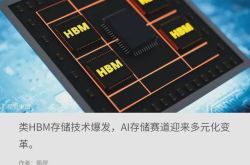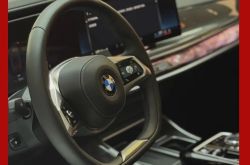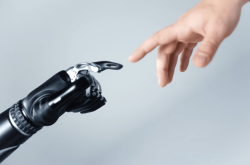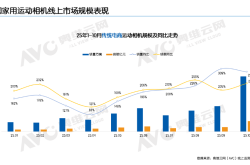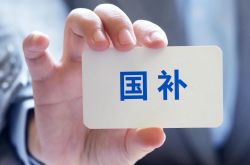Going Wild with Lawsuits! Tesla Files Suit Against Over 30 Chinese Firms: Purely Legal, or Lacking Emotional Consideration?
![]() 11/20 2025
11/20 2025
![]() 502
502
Commercially rational to a tee, yet emotionally oblivious.
On November 19, as reported by Electric Vehicle World, Tesla has been initiating lawsuits against an average of 10 companies per month, taking its corporate clients to court.
Just a few days ago, Wuyou Media found itself unexpectedly embroiled in a lawsuit filed by Tesla. The reason was straightforward: in 2022, the company purchased a Tesla vehicle under its corporate name. At that time, Tesla covered 7,761 yuan in national subsidies, with the stipulation that the vehicle must accumulate at least 20,000 kilometers of driving distance within two years. However, the vehicle failed to meet the required mileage, and since Tesla hadn't received the subsidy, it sued Wuyou Media.
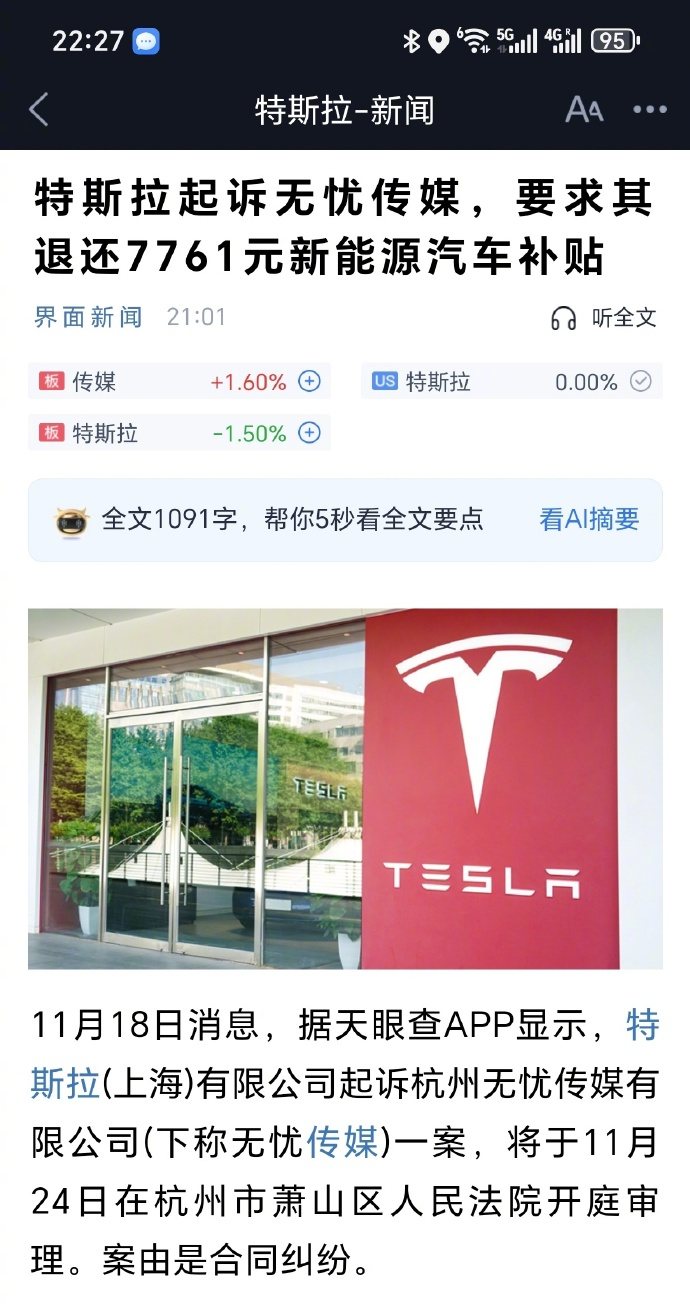
Image Source: Jiemian News
The most contentious aspect of this entire ordeal is Tesla's modus operandi—taking legal action without any prior warning.
Nevertheless, the lawsuit briefly gained momentum before reaching a conclusion. On November 17, Wuyou Media settled the payment, prompting Tesla to submit a withdrawal application.
Yet, Wuyou Media represents just the tip of the iceberg. A thorough examination of court records reveals that Tesla has filed lawsuits against over 30 companies in the past four months, with cases spanning from Shenzhen to Jiaxing and Shanghai. All these lawsuits revolve around unpaid subsidies, ranging from 7,000 to 15,000 yuan. Many companies were taken aback upon receiving the summons, completely unaware of the hidden clause buried within the dozens of pages of their purchase contract until the lawsuit landed on their doorstep.
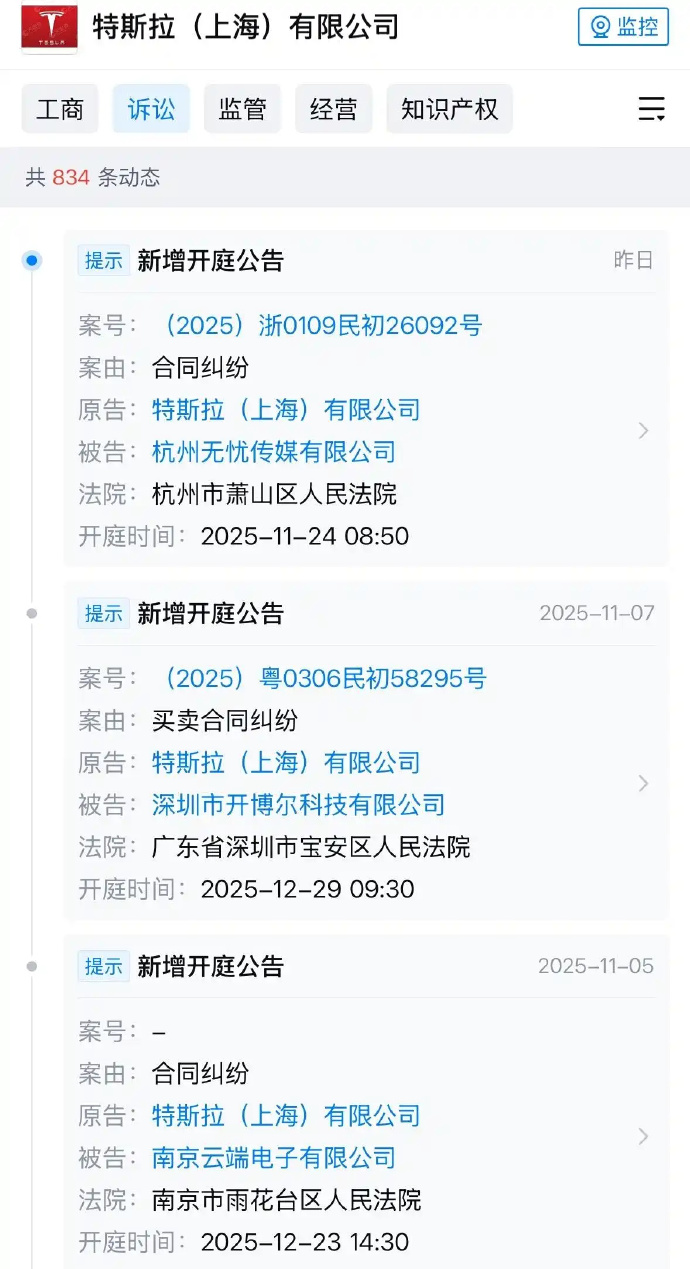
Image Source: Weibo
What's truly baffling is that Tesla's vehicle system is capable of monitoring mileage in real-time and has even sent reminders such as 'drive more to meet the mileage requirement.' Yet, it bypassed formal communication channels and directly resorted to legal action. It's akin to a friend neglecting to repay a debt, and you file a lawsuit without even bringing it up in conversation.
From a legal perspective, Tesla stands on firm ground. Ministry of Finance regulations explicitly state that corporate vehicles must accumulate at least 20,000 kilometers of driving distance within two years to qualify for subsidies. Automakers front the payment and seek reimbursement later. If the mileage requirement isn't met, the automaker bears the financial loss. Tesla, unwilling to shoulder this cost, is passing it on to its clients.
However, 'legal' doesn't always equate to 'reasonable.' In my opinion, Tesla's actions, while legally compliant, lack a sense of empathy. Corporate vehicles are primarily utilized for client transportation and employee commutes, rarely embarking on long-distance journeys. Expecting them to average over 30 kilometers daily for two years is unrealistic for small companies.
In contrast, domestic brands like BYD and NIO typically conduct pre-screenings of corporate qualifications, sign supplementary agreements, or negotiate installment plans in similar scenarios. After all, corporate clients represent long-term business relationships, and such mass lawsuits are virtually unheard of among them.
Yet, Tesla, disregarding these industry norms, directly involves its legal department, perhaps assuming that corporate clients are easy targets. No reminders, no negotiations—just lawsuits. Essentially, treating corporate clients as if they're at their mercy.
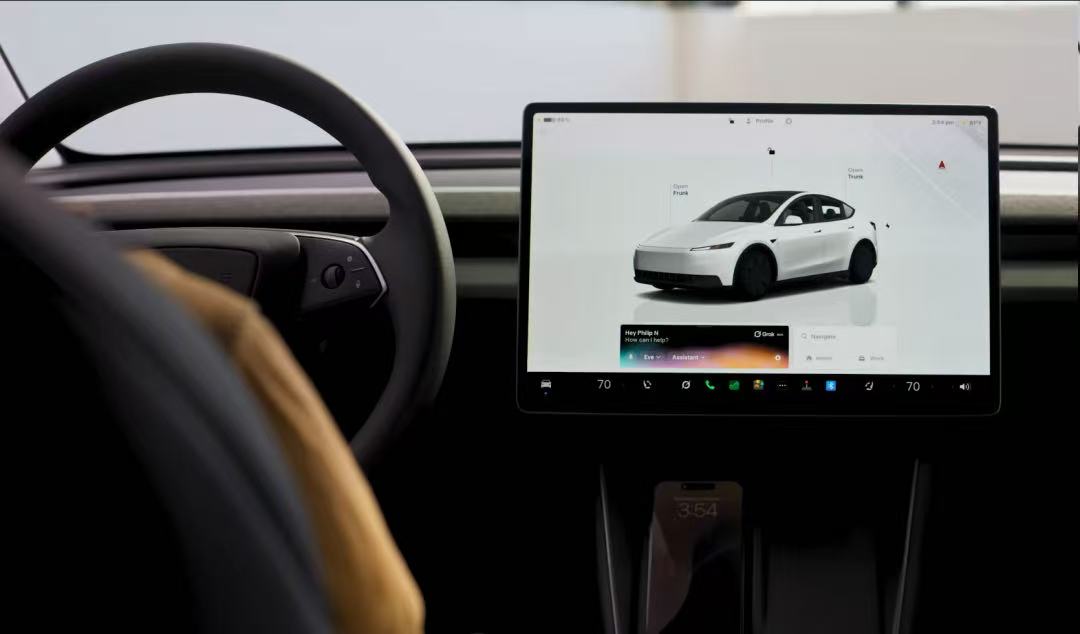
Image Source: Tesla Official Website
This isn't Tesla's first rodeo in demanding refunds for new energy vehicle subsidies. As early as June 2022, some corporate users received repayment notices, though it didn't attract much attention at the time. During the subsidy boom from 2019 to 2022, automakers aggressively fronted payments to boost sales. Now, as the subsidy era fades, only lawsuits remain.
Tesla, once a major beneficiary of the subsidy era, has long touted its direct-sales after-sales service as 'efficient and transparent.' However, when faced with subsidy disputes amounting to a few thousand yuan, it lacks the patience to even engage in negotiations, resorting directly to legal action. This service attitude starkly contrasts with its promotional slogans. In my view, while Tesla may have won the legal battles, it has lost public trust.
To sum up,
The national new energy subsidy program aimed to create a win-win situation for both the industry and consumers. Now that the subsidy era has drawn to a close, the industry is becoming more regulated, and consumers are more discerning. If Tesla continues to be 'arrogant,' focusing solely on legal compliance without any emotional consideration, prioritizing financial gains over user experience, its reputation will inevitably suffer.
Currently, most of the sued companies opt for refund settlements, as pursuing lawsuits over a few thousand yuan isn't financially viable. However, this incident serves as a stark reminder: scrutinize contract terms meticulously before signing, regardless of how reputable the company is, lest you face market repercussions later.
Opinions on this matter are divided. Some argue that Tesla is simply adhering to policy by pursuing subsidies, while others criticize it for dragging long-time clients to court over a few thousand yuan, lacking any semblance of empathy. What's your take? Share your thoughts in the comments.
Cover Image Source: Weibo
Source: Leitech
Images in this article are sourced from the 123RF licensed image library. Source: Leitech

